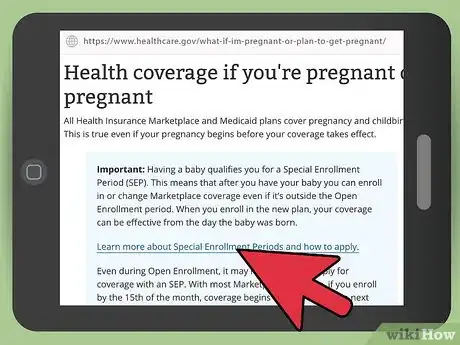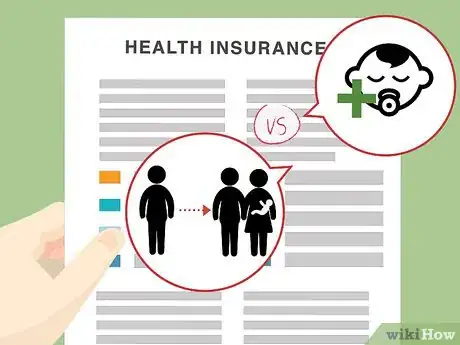X
This article was co-authored by wikiHow Staff. Our trained team of editors and researchers validate articles for accuracy and comprehensiveness. wikiHow's Content Management Team carefully monitors the work from our editorial staff to ensure that each article is backed by trusted research and meets our high quality standards.
This article has been viewed 118,003 times.
Learn more...
As you welcome a new baby into your family, you may be considering how you can ensure your new addition has health insurance coverage. If you have health insurance already through your employer or through a family health care plan, you can add your new baby to your existing health plan by following several steps.
Steps
Part 1
Part 1 of 2:
Contacting Your Insurance Company
-
1Get in touch with your health insurance company as soon as possible. Most health insurance companies require that your newborn be added to an existing policy within 30 days of birth. Under the Affordable Care Act in the United States, you are required to sign your baby up for health insurance. Failing to do so could lead to a penalty of $47.50 per each uninsured child and you will need to pay for medical services for your baby out of pocket.[1]
- Though most larger health insurance carriers will notice your health care claims submission for the birth of the baby and reach out to you about updating your health care insurance, you should be proactive and contact your health insurance company directly. This will ensure your health insurance company is aware you have a new baby and you intend to seek coverage for your new baby.[2]
- Many health insurance companies make it easy for you to update your plan by accessing their App on your mobile phone. You can also call your health insurance company via their customer service line to speak to an insurance agent.
-
2Be aware you will qualify for the special enrollment period as a new parent. In the United States, having a baby is considered a qualifying life event under the Affordable Care Act and you will be eligible for a special enrollment period. This means you will not need to wait for the next enrollment period to insure your baby under your health care plan.[3]
- By enrolling your baby in health care coverage with a special enrollment period (SEP), you can ensure your baby’s coverage can begin the day she is born, even if you do not enroll her until up to 60 days after her birth.
Advertisement -
3Discuss the health insurance options for your expanding family. If you have an existing health insurance plan, you can add your baby to your existing plan or you can decide to change your health insurance plan to a family plan.[4]
- Keep in mind you may be restricted to a certain health insurance plan if you get health insurance through your employer or through government assistance, such as Medicaid. Talk to a health insurance company representative about your ability to upgrade your existing plan or to switch to a different plan that provides better benefits for your new baby.
Advertisement
Part 2
Part 2 of 2:
Providing the Necessary Documentation
-
1Make sure your insurance company has access to birth records for your new baby. Most insurance companies will be able to access the birth records for your new baby through their system. However, you may need to provide further information about your newborn to your insurance company so they can verify her birth and begin the process of enrolling her in health coverage, such as her date of birth, the hospital where she was born, a copy of her hospital records, and a copy of her birth certificate.[5]
-
2Complete the necessary enrollment form for your baby. As part of the enrollment process, you will need to complete an enrollment form your baby. Your insurance provider should provide this form and provide details on how to complete the form.[6]
- If the addition of your baby to your health insurance will cause your health care premium to increase, you will need to complete and submit the necessary enrollment form no later than 12 months after your baby’s date of birth.
-
3Confirm your baby has been added to your health insurance plan. Once you have provided the necessary documentation for the enrollment of your new baby in your health insurance plan, your insurance company should contact you to confirm the enrollment has gone through.[7]
- If you do not hear back from your insurance company within one to two weeks of your application for enrollment for your baby, contact them directly to determine the status of your application.
Advertisement
References
- ↑ http://www.bankrate.com/finance/insurance/adding-a-new-baby-to-your-health-insurance.aspx
- ↑ https://www.healthcare.gov/what-if-im-pregnant-or-plan-to-get-pregnant/
- ↑ https://www.healthcare.gov/what-if-im-pregnant-or-plan-to-get-pregnant/
- ↑ https://www.healthcare.gov/what-if-im-pregnant-or-plan-to-get-pregnant/
- ↑ https://www.healthcare.gov/what-if-im-pregnant-or-plan-to-get-pregnant/
- ↑ https://www.healthcare.gov/what-if-im-pregnant-or-plan-to-get-pregnant/
- ↑ https://www.healthcare.gov/what-if-im-pregnant-or-plan-to-get-pregnant/
About This Article
Advertisement



























































